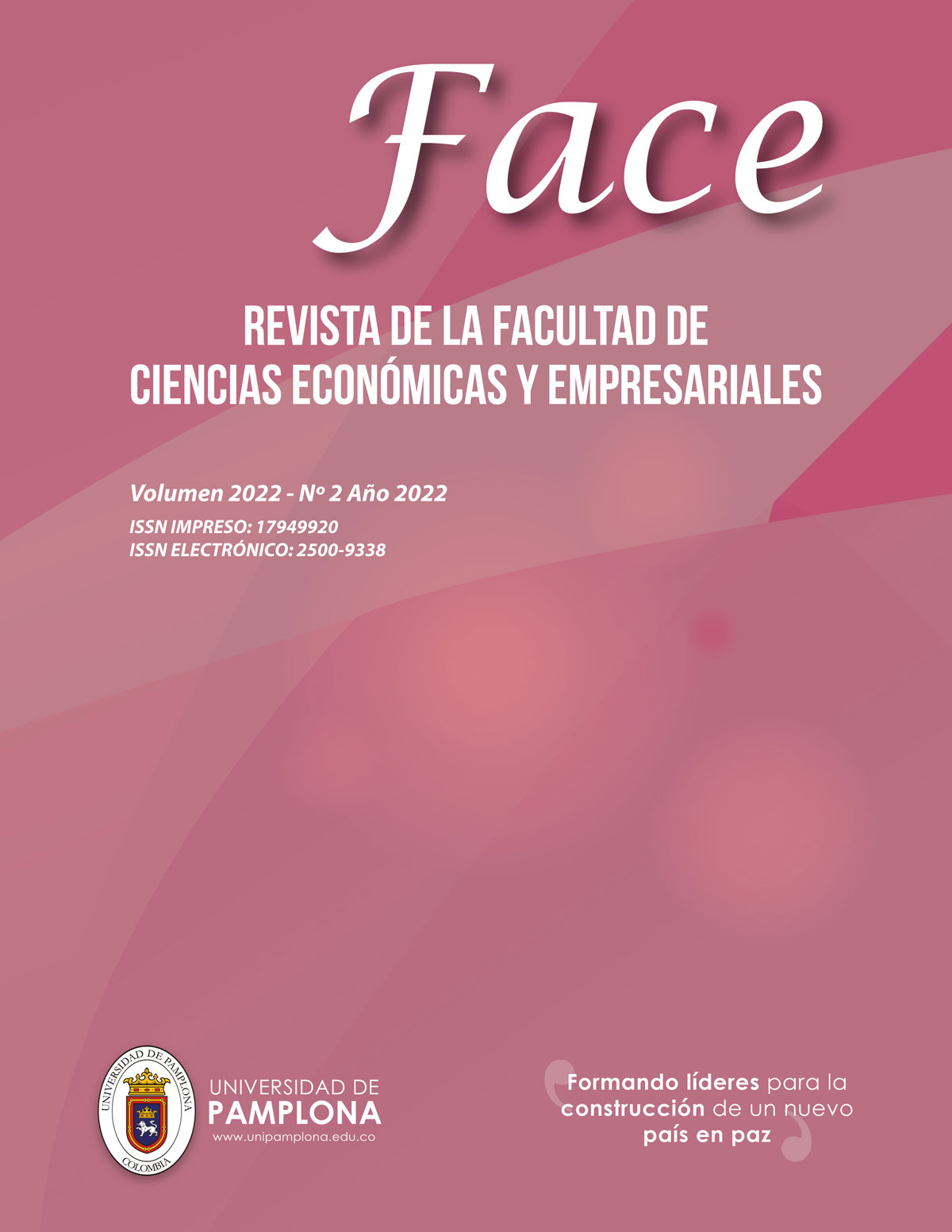La pandemia por covid19 también afecta la información contable: revelaciones y continuidad del negocio ante la crisis
DOI:
https://doi.org/10.24054/face.v22i2.1337Keywords:
Pandemia, Covid-19, información contable, crisisAbstract
This reflective article analyzes the impact of the pandemic in relation to the assumption of the going concern as the basis of accounting information systems. It begins with a review of regulatory adjustments stemming from the Covid-19 pandemic, related to financial information: commercial and tax regulations, accounting standards, and assurance standards. Subsequently, 32 companies from different economic sectors were examined to determine if, based on the information presented in their financial statements, an external user could identify the impact of the pandemic and the measures taken by the company to ensure its continuity, in accordance with the regulatory guidelines defining the concept of going concern. This reflection led us to consider some key elements for companies to use accounting information in the decision-making process during times of crisis, elements that are not always found in general purpose reports. Considering that society at large is the user of financial statements, it was concluded that such information is not sufficiently comprehensive or relevant to influence user decisions; more analysis and interpretative support must be incorporated so that the user has a clear idea of the financial situation and the impact of the Covid-19 pandemic on businesses. Finally, it was noted that small businesses should improve the quality and use of this information to support their decision-making processes.
Downloads
References
Barbei, A. A., González, P. C., & Tiberi, S. (Abril de 2020). “¿Qué dicen las empresas sobre el COVID-19?:.Obtenido de Centro de Estudios en Contabilidad Internacional: https://www.econo.unlp.edu.ar/frontend/media/66/20266/d08b7f54db8fdd11a3f526c1a3ae1446.pdf
Beverinotti, J., & Deza, M. C. (1 de junio de 2020). BID, Banco Interamericano de Desarrollo.doi:http://dx.doi.org/10.18235/0002444
Consejo Técnico de la Contaduría Pública. (2020). Orientación Técnica N°18. Obtenido de www.ctcp.gov.co: https://www.ctcp.gov.co/publicaciones-ctcp/orientaciones-tecnicas/orientacion-tecnica-no-18-covid-19
Instituto Nacional de Contadores Públicos. (2022). Tecnologías disruptivas, aportes y desafíos para la profesión contable. Obtenido de Contarte -Sonia Rojas: https://contarte.incp.org.co/tecnologias-disruptivas-aportes-y-desafios-para-la-profesion-contable/
OIT / Oficina de la OIT para los Países Andinos. (Noviembre de 2020). Impacto de la COVID-19 en las Mipymes colombianas.Obtenido de https://www.acopi.org.co/wp-content/uploads/2020/12/impacto_covid_web-1.pdf
Presidencia de la República de Colombia. (2020). Decreto 1076 de 2020. Obtenido de Decreto 1076 de 2020: https://dapre.presidencia.gov.co/normativa/normativa/DECRETO%201076%20DEL%2028%20DE%20JULIO%20DE%202020.pdf
Presidencia de la República de Colombia. (2020). Decreto 457 de 2020. Obtenido deDecreto 457 de 2020: https://dapre.presidencia.gov.co/normativa/normativa/DECRETO%20457%20DEL%2022%20DE%20MARZO%20DE%202020.pdf
Presidencia de la República de Colombia. (2020). Decreto 488 de 2020. Obtenido de Decreto 488 de 2020: https://dapre.presidencia.gov.co/normativa/normativa/DECRETO%20488%20DEL%2027%20DE%20MARZO%20DE%202020.pdf
Presidencia de la República de Colombia. (2020). Decreto 531 de 2020. Obtenido de Decreto 531 de 2020: https://dapre.presidencia.gov.co/normativa/normativa/DECRETO%20531%20DEL%208%20DE%20ABRIL%20DE%202020.pdf
Presidencia de la República de Colombia. (2020). Decreto 539 de 2020. Obtenido de Decreto 539 de 2020.
Presidencia de la República de Colombia. (2020). Decreto 593 de 2020. Obtenido de Decreto 593 de 2020: https://dapre.presidencia.gov.co/normativa/normativa/DECRETO%20593%20DEL%2024%20DE%20ABRIL%20DE%202020.pdf
Presidencia de la República de Colombia. (2020). Decreto 639 de 2020. Obtenido de Decreto 639 de 2020: https://dapre.presidencia.gov.co/normativa/normativa/DECRETO%20639%20DEL%208%20DE%20MAYO%20DE%202020.pdf
Ramírez Elias, G., & Pérez Paredes, A. (2021). Las finanzas personales bajo el impacto de la Covid-19 en México.Enfoque Disciplinario,6(1), 32-41. Recuperado a partir de http://enfoquedisciplinario.org/revista/index.php/enfoque/article/view/25
Rodríguez, J., & Castro, R. (junio de 2020). La pandemia y el plan de continuidad del negocio: Un lección para la adecuada gestión del riesgo.Obtenido de https://ricsmanagement.com/press/la-pandemia-y-el-plan-de-continuidad-del-negocio/
Rodríguez, M. D. (junio de 2020). La Contabilidad en tiempos del Covid-19. Contabilidad y Auditoría, año 26(Nº51), 110-153. Recuperado el febrero de 2022, de http://ojs.econ.uba.ar/index.php/Contyaudit/article/view/1744/2478
UJTL, Sistema de Bibliotecas. (2022). Emis University. Obtenido de Bases de datos: https://emis.utadeoproxy.elogim.com/php/home/
Downloads
Published
Versions
- 2022-05-22 (6)
- 2022-05-22 (5)
- 2022-05-22 (4)
- 2022-05-22 (3)
- 2023-03-22 (2)
- 2022-06-03 (1)
How to Cite
Issue
Section
License
Copyright (c) 2022 FACE: Revista de la Facultad de Ciencias Económicas y Empresariales

This work is licensed under a Creative Commons Attribution-NonCommercial-ShareAlike 4.0 International License.





